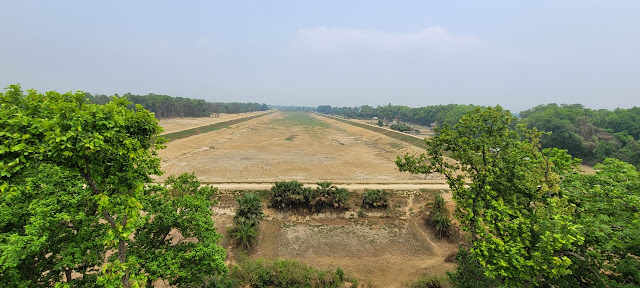Begums shown the door as Bangladesh seeks a fresh start
http://www.dailytimes.com.pk/default.asp?page=2007%5C04%5C18%5Cstory_18-4-2007_pg4_19
Begums shown the door
as Bangladesh seeks a fresh start
By Helen Rowe
The interim government continues to enjoy broad support from voters, who, tired of bickering and corrupt politicians, appear to be willing to give their new leaders time to carry out reforms
BANGLADESH sought a new start Tuesday as its two main political leaders - blamed for the nation's descent into chaos and corruption - face exile abroad, analysts said.
Dubbed the "battling begums," outgoing prime minister Khaleda Zia and Sheikh Hasina Wajed come from rival political dynasties that have dominated the political landscape since Bangladesh won independence in 1971. But now Zia is expected to follow Sheikh Hasina into exile. Sources close to the ex-premier accused the new military-backed government of using her younger son Arafat Rahman to "blackmail" her into leaving.
"This is the end of the begums," said Ataur Rahman, a political science professor at Dhaka University, referring to the honorific title by which the women are known.
"They have to leave the country because their politics have failed and the government has acted on the aspiration of the people," he said.
"They are being forced out of the country because had they stayed at home they would have continued to influence political forces within the country and that would have been a big impediment to the new government's aspirations to clean up politics and facilitate the emergence of a new political order in Bangladesh," he added.
Media reports Tuesday said Zia was under "tremendous pressure" from the interim government and had agreed to leave, initially for Saudi Arabia, on condition that her sons be allowed to join her.
Her influential elder son, Tareque, is currently in custody on extortion charges but his trial was suspended for six months. Her other son, Arafat, was arrested over the weekend but released late Monday. Last week, murder and extortion charges were filed against Sheikh Hasina while she was on holiday in the US, throwing huge obstacles in the way of her return.
Although she vowed to defend herself in person, a return trip scheduled for Saturday was cancelled. The fate of the two women leaders is crucial to the political stability of the impoverished country where many believe that democracy can only be rebuilt without them.
Zia and Sheikh Hasina, both former premiers who are said to loathe each other, have maintained a stranglehold on power since democracy was reintroduced in 1991. Since then, their mutual antipathy has repeatedly played out on the streets of Bangladesh in bloody showdowns between their parties - Sheikh Hasina's Awami League and Khaleda Zia's Bangladesh Nationalist Party (BNP).
The result was a dysfunctional democracy and a bitterly polarised nation, with business leaders also counting the costs of repeated strikes and blockades. Many blame their confrontational approach for January's political crisis that ended in the cancellation of elections scheduled for later that month and the imposition of emergency rule under a military-backed government.
"The reason the begums were determined to stay in the country was that they do not want to recognise their failures," said Asif Nazrul, a professor of Law at Dhaka University. "The two leaders are being forced out in order to effectuate reforms. It may not be the end of their legacies in Bangladesh.
But if they come back after some years, they may not be able to reassert their authority the way they used to do in the past," he added. Zia is the widow of assassinated president Ziaur Rahman, while Sheikh Hasina is the daughter of Bangladesh's independence leader and first president Sheikh Mujibur Rahman, who was also murdered.
"I think their (Zia and Sheikh Hasina's) exit from Bangladesh's political scene will usher in a new era of transparent and dynasty-free politics in the country," added Ataur Rahman. The new government has pledged to clean up Bangladesh politics before holding rescheduled polls before the end of 2008. At least 50 prominent figures have been arrested on corruption charges.
Meanwhile, the interim government continues to enjoy broad support from voters, who, tired of bickering and corrupt politicians, appear to be willing to give their new leaders time to carry out reforms. - afp
-- Daily Times. Pk


Comments
Post a Comment